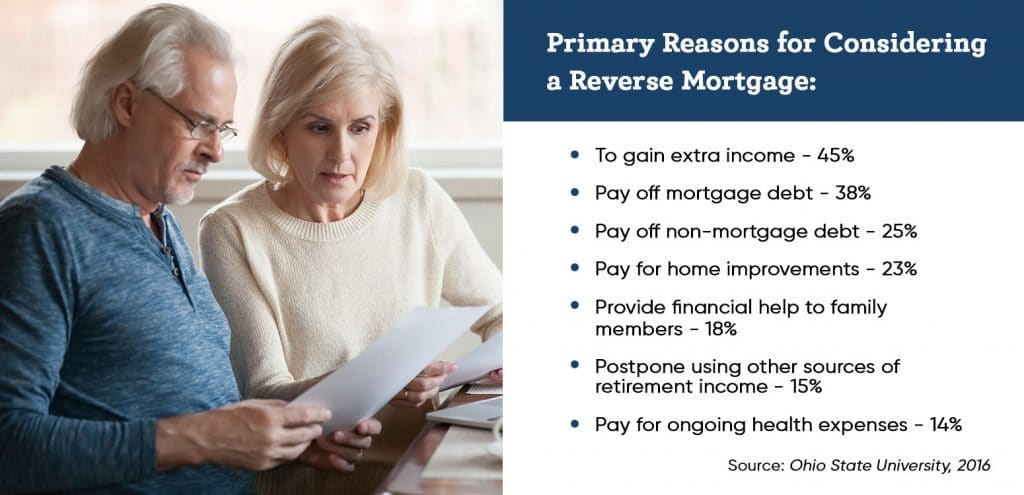Can You Purchase Reverse Mortgage as Part of Your Financial Strategy?
Can You Purchase Reverse Mortgage as Part of Your Financial Strategy?
Blog Article
Empower Your Retired Life: The Smart Means to Purchase a Reverse Home Mortgage
As retirement techniques, several individuals seek efficient approaches to boost their economic freedom and health. Amongst these methods, a reverse mortgage arises as a practical option for home owners aged 62 and older, allowing them to take advantage of their home equity without the requirement of month-to-month payments. While this financial tool provides a number of benefits, including boosted cash circulation and the potential to cover necessary costs, it is essential to comprehend the intricacies of the application procedure and essential considerations included. The next steps may disclose how you can make an educated choice that might considerably influence your retirement years.
Understanding Reverse Mortgages
Understanding reverse home loans can be vital for home owners looking for financial versatility in retired life. A reverse home mortgage is a financial product that allows qualified house owners, commonly aged 62 and older, to convert a portion of their home equity right into money. Unlike typical home mortgages, where consumers make regular monthly settlements to a loan provider, reverse mortgages enable homeowners to receive repayments or a lump sum while preserving possession of their home.
The amount readily available through a reverse home mortgage depends upon a number of aspects, consisting of the home owner's age, the home's worth, and present interest rates. Notably, the lending does not need to be repaid till the property owner offers the home, relocates out, or passes away.
It is vital for prospective consumers to understand the effects of this economic product, including the effect on estate inheritance, tax considerations, and ongoing responsibilities associated to building upkeep, taxes, and insurance coverage. Furthermore, counseling sessions with licensed professionals are usually required to make certain that debtors fully comprehend the conditions of the finance. Overall, a thorough understanding of reverse mortgages can equip house owners to make educated decisions about their economic future in retirement.
Advantages of a Reverse Mortgage
A reverse mortgage uses a number of compelling advantages for eligible property owners, specifically those in retired life. This financial tool permits elders to convert a part of their home equity right into cash, giving crucial funds without the requirement for regular monthly home mortgage settlements. The money acquired can be utilized for numerous objectives, such as covering clinical expenditures, making home enhancements, or supplementing retired life income, hence enhancing total financial flexibility.
One considerable benefit of a reverse home mortgage is that it does not require settlement up until the homeowner vacates, sells the home, or passes away - purchase reverse mortgage. This function enables senior citizens to keep their lifestyle and satisfy unforeseen prices without the burden of regular monthly payments. Additionally, the funds gotten are usually tax-free, allowing property owners to utilize their cash without anxiety of tax obligation ramifications
Additionally, a reverse mortgage can offer peace of mind, recognizing that it can work as a monetary safety web during challenging times. Home owners also keep ownership of their homes, guaranteeing they can continue staying in a familiar atmosphere. Inevitably, a reverse mortgage can be a strategic economic source, empowering retired people to manage their financial resources successfully while enjoying their golden years.
The Application Process
Navigating the application process for a reverse mortgage is a crucial action for homeowners considering this economic choice. The initial stage includes examining qualification, which generally calls for the homeowner to be a minimum of 62 years old, own the property outright or have a low mortgage equilibrium, and occupy the home as their primary residence.
As soon as qualification is verified, home owners have to go through a counseling session with a HUD-approved counselor. This session guarantees that they fully understand the ramifications of a reverse home mortgage, consisting of the duties entailed. purchase reverse mortgage. After finishing therapy, applicants can continue to gather needed paperwork, including evidence of income, properties, and the home's value
The next action requires submitting an application to a lender, who will certainly examine the financial and residential or commercial property qualifications. An appraisal of the home will certainly also be conducted to identify its market price. If accepted, the loan provider will offer financing terms, which need to be assessed meticulously.
Upon approval, the closing process complies with, where last documents are authorized, and funds are paid out. Understanding each stage of this application procedure can significantly improve the home owner's self-confidence and decision-making relating to reverse home loans.

Trick Considerations Prior To Purchasing
Buying a reverse mortgage is a substantial economic decision that needs careful consideration of several essential factors. Examining your economic needs and goals is similarly important; establish whether a reverse mortgage aligns with your long-lasting strategies.

A reverse mortgage can impact your eligibility for certain government benefits, such as Medicaid. By thoroughly assessing these factors to consider, you can make a much more enlightened decision about whether a reverse mortgage is the ideal monetary technique for your retirement.
Taking advantage of Your Funds
When you have protected a reverse home loan, effectively handling the funds ends up being a priority. The versatility of a reverse mortgage allows homeowners to use the funds in various methods, yet calculated planning is essential this website to maximize their advantages.
One crucial approach is to produce a budget plan that details your regular monthly expenses and economic goals. By recognizing necessary expenditures such as health care, real estate tax, and home maintenance, you can allocate funds appropriately to ensure long-term sustainability. Furthermore, take into consideration making use of a section of the funds for financial investments that can produce revenue or appreciate in time, such as dividend-paying stocks or shared funds.
An additional essential aspect is to maintain an emergency situation fund. Setting aside a reserve from your reverse mortgage can aid cover unexpected prices, offering satisfaction and economic security. Seek advice from with an economic expert to check out possible tax effects and just how to integrate reverse mortgage funds right into your total retirement technique.
Eventually, prudent management of reverse home loan funds can boost your financial safety, permitting you to enjoy your retired life years without the tension of financial unpredictability. Mindful preparation and educated decision-making will make sure that your funds function effectively for you.
Final Thought
In verdict, a reverse mortgage presents a viable financial strategy for elders seeking to boost their retired life experience. By transforming home equity right into easily accessible funds, people can address essential costs and safe and secure added monetary sources without sustaining regular monthly payments.
Understanding reverse home mortgages can be crucial for homeowners looking for economic flexibility in retirement. A reverse mortgage have a peek here is an economic item that enables qualified home owners, typically aged 62 and older, to convert a section of their home equity right into money. Unlike conventional home mortgages, where borrowers make regular monthly repayments to a loan provider, reverse home mortgages make it possible for property owners to get payments or a swelling sum while maintaining possession of their residential or commercial property.
In general, a detailed understanding of reverse home mortgages can empower property owners to make informed decisions concerning their economic future in retirement.
Consult with an economic advisor to explore possible tax implications and exactly how to incorporate reverse home mortgage funds into your overall retired life approach.
Report this page